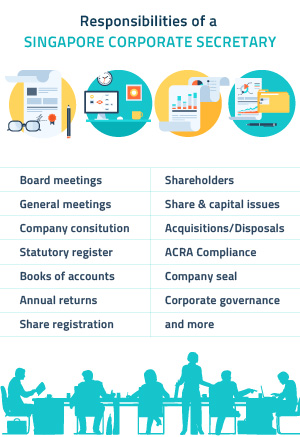Singapore Company Secretary Guide
With changing and increasingly complex regulations, local businesses must view company secretaries as an investment, not a burden.
Annually, the Accounting and Corporate Regulatory Authority (“ACRA”) issues approximately 10,000 summonses to companies and their directors who are in default of the statutory requirements under the Companies Act. Amongst the various reasons for non-compliance, the most common reason cited is ignorance or lack of awareness , which emphasizes the crucial role that a company secretary plays in keeping the company, directors, shareholders and auditors fully aware of statutory requirements.
Therefore, retaining a well-trained and experienced company secretary is vital for all companies seeking to do business in Singapore. In this article we will be talking about the following :
- What is the role of Company Secretary?
- Who should be my company secretary?
- What are the powers of the company secretary
What is the main role of a Singapore Company Secretary?
Company secretaries (who are also considered officers of a company) assist in the administration of a company and ensure that directors and shareholders are kept well informed of statutory obligations, such as the annual filing of audited accounts and the holding of annual general meetings (“AGM”).
In Singapore, the criteria for being a company secretary for a private limited company is not stringent and this role can be undertaken by any Singapore resident (i.e. Singapore citizen, permanent resident or an individual with an employment pass) above 18 years of age.
This unfortunately leads to a “gap” of knowledge as inexperienced company secretaries may lapse in keeping the company, its directors, shareholders and auditors duly informed of the statutory requirements and deadlines.
Additionally, there is no minimum cap on the number of companies that an individual can be a company secretary of; hence the level of dedication and responsiveness of the company secretary may be compromised.
On the other hand, there are far more requirements for being a company secretary of a public company, as the company secretary would need to be trained and qualified as a lawyer, an accountant, or be a member of the Singapore Association of the Institute of Chartered Secretaries and Administrators (“SAICSA”).
While these requirements only apply to a company secretary of a public company, ACRA may require a private limited company to appoint a professionally qualified company secretary if the company is found to be persistently in default of the statutory requirements.
How should I decide on who should be my company secretary?
Transparency is the lifeblood of the market. Directors need to take their statutory duties on annual reporting seriously. ACRA will spare no effort to ensure that the business information on our register is accurate and reliable, for the benefit of all market players,” Mr Kenneth Yap, Chief Executive Officer of ACRA, was quoted as saying.
As an officer of the company, a company secretary will have access to; and is responsible for, the company’s registers, minutes book and electronic filings with the ACRA. It should be noted however, that ACRA considers it to be the duty of the directors of a company to take all reasonable steps to ensure that the company secretary has the requisite knowledge, experience and is capable of carrying out all duties required of a company secretary. Otherwise, directors will be held responsible by ACRA for any lapses in updating the registers and completion of the appropriate filings and returns in relation to changes within the company in a timely manner.
Hence, it is generally advisable that directors opt for a professional corporate secretarial firm to perform this role and undertake to provide sound advice and ensure that all corporate actions performed by the company (i.e. such as a transfer or allotment of shares) are properly documented, filed and valid under Singapore law.

A good company secretary must also be proactive and undertake the role of being the main liaison to communicate important information to all parties. In the case of the AGM, which is held once every calendar year, a good company secretary will provide advance notice to the company on when it should instruct its auditors to commence the audit. Thereafter, the company secretary will prepare the necessary documents and liaise with directors and shareholders on a timely basis, to ensure that a quorum is present on the proposed date for the AGM to be convened and held. A good company secretary will also be able to advise the company when the annual returns should be filed with ACRA, (i.e. within one month of the AGM. If otherwise, penalties may be imposed by ACRA for not meeting the prescribed deadlines for the AGM and annual return, respectively).
Besides the annual return with ACRA, a company is also required to file its taxes with the Inland Revenue Authority of Singapore (“IRAS”). Certain companies that meet the requirement may even apply for government grants or tax rebates. For example, IRAS has a Productivity and Innovation Credit (“PIC”) scheme which can give companies up to 400% tax deductions or allowances and/or 60% cash payout for investments in innovation and productivity improvements. A good company secretary who is regularly updated on new government benefits and schemes will likewise keep the company informed and can advise how a company can qualify under these schemes, which will result in cost savings for the company.
Naturally, the ability of a company secretary to advise the client is also dependent on how well the company secretary understands the company’s business. The onus is on the company to give the company secretary a good idea of what the company’s business is.
What are the duties and responsibilities of the Company Secretary?
The company secretary may also perform the following duties, depending on the needs of a company:
- Maintain and update the company’s registers and minutes books
- Administer, attend and prepare minutes of meetings of directors and shareholders
- Assist the Chairman of the meeting in the conduct of the meeting
- Ensure compliance with statutory requirements under the Companies Act
- Ensure compliance with the company’s Memorandum and Articles of Association (“M&AA”)
- Keep the company and its directors aware of the deadlines for annual returns and any other returns that should be filed with ACRA
- Advise the company on and attend to the appropriate electronic filings with the ACRA for changes within the company within the prescribed timeframes as set out by the ACRA
- Ensure safe custody and proper use of the company seal, if applicable
- Communicate to the company and its directors any relevant changes in statutory law on a timely basis
- Function as an intermediary between the company and the relevant authority for specific needs of the company such as ACRA, the Stock Exchange and the Inland Revenue Authority of Singapore.
A good company secretary is also always approachable and available to provide the company with advice as to what the proper procedures should be with regards to any agreements, corporate guarantees, leases and investments, or any other issues that the company may have whilst conducting its business in Singapore.
What are the powers of the company secretary?

More importantly, a company secretary can also advise the company and its directors on what should be done to stay compliant when executing various corporate actions. For example, when entering into a loan agreement, the company secretary can advise the company and its directors if any terms and conditions of the loan agreement could potentially conflict with the company’s M&AA, assist to prepare the necessary documentation such as a directors’ resolutions in writing to approve the transaction, appoint a corporate representative to legally represent the company to sign all relevant documents pertaining to the loan agreement and ensure that the proper authorisation is given for the affixing of the common seal of the company in accordance to the company’s M&AA.
Conclusion
Companies must make the right decision when retaining a company secretary. It is important that companies invest right, start right and stay on the right track with a trusted company secretary who can give sound advice on statutory requirements and how to stay compliant for all your corporate actions.
Read more: Changing a Singapore company’s corporate secretary »
Singapore Company Secretary FAQs
- This can be done through a three-steps process, in which the new company secretary can assist in.First, Form 45B should be signed by the new secretary, giving his or her consent for the appoint. The resigning secretary will need to submit his or her resignation letter as the secretary of the company.Secondly, a board resolution noting the resignation of the current secretary and approval of the appointment of a new secretary needs to be passed by the board of directors.
Finally, notification for these changes are required to be submitted to ACRA within 14 days from effective date.
- Yes, the company secretary can be appointed as a board member of the company provided that there are other directors already on board. A company secretary cannot act as the sole director.
- A board resolution should be passed by the board to approve the change of registered office address first. Thereafter the local resident director or company secretary can file the notification for change of registered office address with ACRA.
- Secretarial matters of non-routine nature will be chargeable on a per request basis and all out of pocket expenses for services.Examples include:
- Increase of paid-up capital
- Change of shareholding
- Changes to Constitution
- Changes to the board composition of directors
- Opening of additional bank accounts
- Change of registered address
Helping you manage your companies, whatever their size
Rikvin makes it easy for companies, business owners, and directors to manage company records and filings with ACRA. It’s the perfect solution for your company while we manage and do all the compliance; you can focus more on growing your business.


